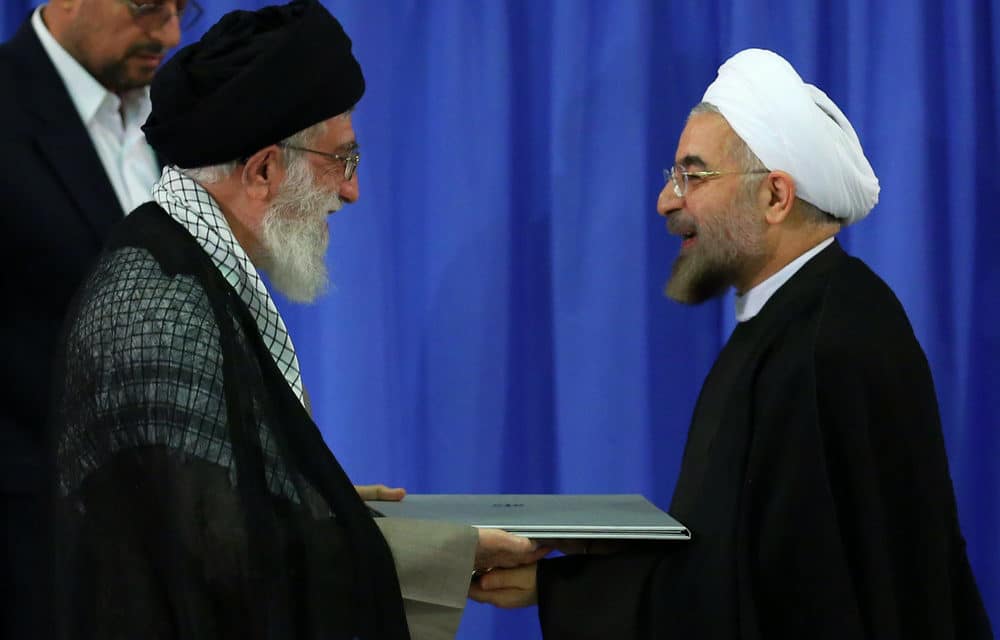Iran’s Supreme Leader and President Hassan Rouhani (File)
Iran’s regime has disqualified former President Hassan Rouhani from elections on March 1.
Rouhani, President from 2013 to 2021, was barred by the 12-member Guardian Council from campaigning for the Assembly of Experts, the 88 men who nominally choose and monitor the Supreme Leader.
Rouhani has served on the Assembly since 2000.
The Guardian Council is made up of six clerics, appointed by the Supreme Leader, and six jurists. It vets and rules on the eligibility of all candidates, including for the Presidency.
The March 1 polls are for the Assembly of Experts and Iran’s Parliament, the 290-seat Majlis.
Rouhani, a centrist, was permitted to run for the Presidency in 2013 after his mentor and former President Hashemi Rafsanjani was banned by the Council. The step backfired when three other candidates split the conservative and hardliner vote, letting Rouhani in with a first-round victory.
In an open letter released on his official website on Wednesday, Rouhani chided the Guardian Council as a “totalitarian” body making a “politically motivated” decision. He challenged it to explain his removal.
So far, the Council has not responded.
Rouhani entered office with Iran in economic difficulties, amid corruption, mismanagement, and US-led sanctions over Iran’s nuclear program. He persuaded the Supreme Leader that revived negotiations were necessary to prevent collapse.
Iran completed the nuclear deal with the 5+1 Powers (US, France, Germany, UK, China, and Russia) in July 2015. But the Trump Administration withdrew in May 2018 and imposed comprehensive sanctions on Tehran six months later, restarting the economic crisis and eroding Rouhani’s standing.
Hardliners took control of the Majlis in managed elections in February 2020. They effectively tied Rouhani’s hands later that year with legislation mandating Iran’s breaking of the terms of the 2015 agreement.
The regime then ensured that 2013 would not be repeated, arranging for conservative cleric Ebrahim Raisi to win the Presidential election of June 2021.
Managing Elections, Depressing Turnout
Threatened by mass protests after the disputed 2009 Presidential election and by Rouhani’s surprise 2013 victory, the regime has broken up political parties, shutting down their headquarters and communications. Hundreds of political activists and journalists have been imprisoned, and the leaders of the Green Movement — 2009 Presidential candidates Mir Hossein Mousavi and Mehdi Karroubi and Mousavi’s wife, academic and artist Zahra Rahnavard — put under strict house arrest.
Most prominent reformists have been barred from elections, as have some conservatives, including former Parliament Speaker and Presidential candidate Ali Larijani. Even former President Mahmoud Ahmadinejad — whose re-election was assured by the Supreme Leader in 2009 — and members of his inner circle have been disqualified.
The clampdown has come at a high cost to voter turnout and the illusion of a democratic process. Turnout in the 2020 Parliamentary election was 42.5%, the lowest in the history of the Islamic Republic. Participation in the 2021 Presidential ballot of 48.5% also set a record, with a sharp fall from 72% in 2017.
Reformist cleric and former Deputy President Mohammad Ali Abtahi said Rouhani’s disqualification is a “disaster” in which the Guardian Council is “deciding the fate” of an entire nation. Rouhani’s 1st Vice President Eshaq Jahangiri said his hope had been dashed for an address of “the current critical conditions” in Iran.


Most Iranians had long passed these bogus elections, and in this round the remaining have moved on. What is left is mullah mercenaries and few foreign intellectuals.
In the meantime…
Recurring Tale: Morning Call to Prayer and the Gallows
https://iranwire.com/en/features/124795-recurring-tale-morning-call-to-prayer-and-the-gallows/
Rouhani has not appealed to the Guardians Council: https://www.tasnimnews.com/fa/news/1402/11/09/3030653
At least 120 disqualified candidates have registered their objections and their cases are being reviewed.
Meanwhile, Rpuhani’s former chief of staff insists on forming a moderate-reformist joint list for the Majlis elections: https://www.isna.ir/news/1402110906222
[Editor’s Note: Commenter is wrong over the disqualification of Rouhani, although the outcome of the appeal is awaited.
And Iran’s largest reformist parties were banned amid the mass protests over the disputed 2009 Presidential elections. Reformists continue to operate individually while facing severe restrictions — and sometimes prosecution — by the regime.]
“Iran’s regime has disqualified former President Hassan Rouhani from elections on March 1.”
Correction. The Guardians Council did not qualify Rouhani. The jurists are elected by the Majlis from a list of qualified candidates provided by the judiciary. Rouhani can appeal the decision.
“THE REGIME HAS BROKEN UP POLITICAL PARTIES, SHUTTING DOWN THEIR HEADQUARTERS AND COMMUNICATIONS”
This is a nonsense. Reformist parties are operating freely. They are currently considering forming a unified list pending the outcome of the appeals process: https://www.isna.ir/news/1402110805512
“PARTICIPATION IN THE 2021 PRESIDENTIAL BALLOT OF 48.5% ALSO SET A RECORD, WITH A SHARP FALL FROM 72% IN 2017.”
During a pandemic with no mail-in voting.
[Editor’s Note: Comment — probably deliberately — overlooks the effect of the dissolution of long-established parties, forcing at a later point expenditure of time and resources (while still under regime threat) to try and create a new structure.]
The MOIR and IIPF parties were banned within a year or two of the election only to be reborn as the NEDA (Voice) and Ettehad-e-Mellat (National Unity) parties. Reformists continue to run their own parties, newspapers and websites. They hold events and conferences regularly and appear on debates in official media and semi-official media.
The appeals process continues with yet another 550 reinstated to run: 13,200 have now been approved (2242 in total reinstated): https://www.farsnews.ir/news/14021108001070
By contrast, the total number of candidates in 2020 was 7,200 after the completion of the appeals process.
[Editor’s Note: Commenter ignores both the pre-2013 crackdown and pthe post-2017 crackdown on reformist parties and candidates.]
The Islamic Iran Participation Front was formed in 1999. Iran has factional politics, not (individual) party politics.The new parties were formed during Rouhani’s tenure and there was no threat from the judiciary. They helped reformist do well in the 2016 and win the 2017 elections.